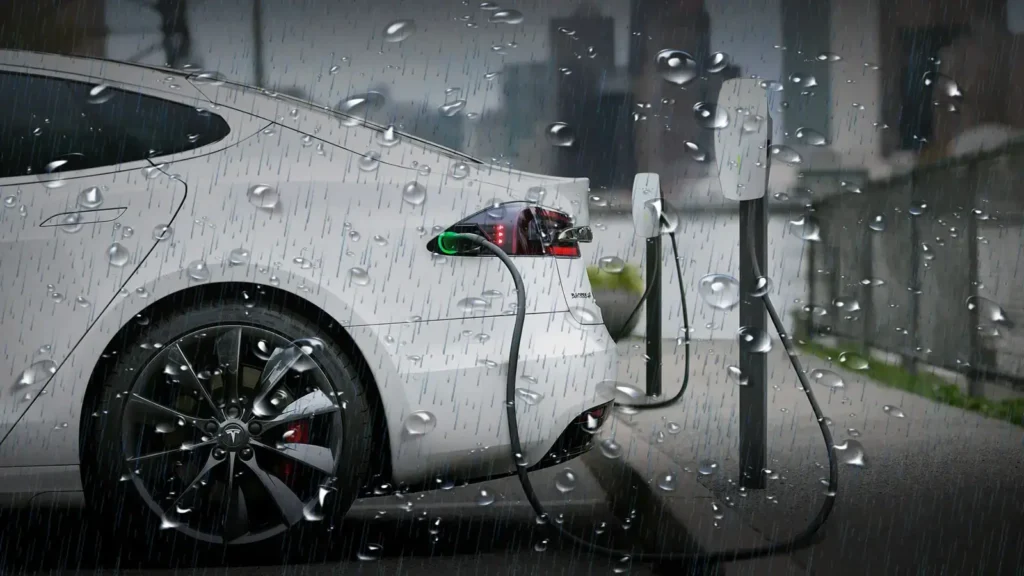
Exploring EV Charging Safety in Rainy Conditions Many electric vehicle owners question the safety of charging their EVs in wet weather, including rain or snow.
Can moisture pose potential issues? This guide provides insights into charging EVs during rain or storms, along with safety tips. Stay informed about ‘EV Charging Safety in Rainy Conditions’ for a secure charging experience.
Table of Contents
Understanding EV Charging Components
To assess if rain can affect charging, it helps to first understand what’s involved:
- The charging port on the vehicle where the connector plugs in.
- The charge connector consists of the plug that goes into the port.
- The charge station or wall outlet that provides the electricity.
The port and connector have weather protection features that allow safe charging in the rain.
Weatherproof EV Charge Ports: Ensuring EV Charging Safety in Rainy Conditions
Modern electric vehicles have charge ports designed to withstand getting wet:
- Port covers and flaps block water from directly entering.
- Rubber gaskets seal the port when the charge connector is inserted.
- A drain system collects and channels out any moisture.
This prevents rain from reaching the internal charging components.
Charge Connectors are Water-Resistant
Charge connectors also have weatherproofing like covers and sealed plugs. Features include:
- Solid housings prevent water intrusion.
- Rubber flaps, grommets, and boots.
- Internal seals around electrical prongs.
- UV-resistant cables and plastics.
Reputable brands are tested for use in wet conditions.
Wall Outlets Have Protective Shutoffs
AC wall outlets and charge stations have water protection as well:
- Outlets are covered when not in use.
- Circuit shutoff will trip if significant water is detected.
- Charge stations have weatherized electrical components.
- Stations are tested for water exposure during certification.
This equipment is designed for safe operation in typical rain or snow.
Read also: Discover the EV Battery Charge Time for Charging from 0-80%
Is it Recommended to Charge in the Rain?

In general, light-to-moderate rain is not a concern for charging your EV:
- Check that the charge port cover fully closes to seal the port.
- Make sure the connector seals tightly when plugged into the port.
- Avoid submerging the wall outlet or station in puddles.
- Stop charging if electrical arcing, sparks, or odd smells occur.
Exercise sensible precautions in wet conditions, yet charging in the rain is generally safe. Embrace EV Charging Safety in Rainy Conditions.
Steps for Safe Charging in Rain or Snow
Follow these tips for safe charging of your EV in wet weather:
- Make sure the charge port covers are fully sealed when closed. Check for damage or gaps.
- Examine the charge connector for cracked seals or other defects. Don’t use if compromised.
- Insert the connector carefully and confirm it clicks and seals fully into the port.
- Avoid puddling or spraying pressurized water directly at the equipment.
- Never try to charge if the port or connector is actively submerged in water.
- Stop charging immediately if any electrical anomalies are observed.
- Dry out the equipment with towels when done before disconnecting.
Proper maintenance and usage ensure charging remains safe in wet conditions.
What to avoid when charging in rain or snow
While EV charging equipment is water resistant, extremes should still be avoided:
- Don’t try to charge with the port cover broken or the door open.
- Avoid using damaged connectors with compromised weather seals.
- Don’t deliberately spray pressurized water from hoses on the gear.
- Never attempt to charge fully submerged underwater.
- Stop charging if electrical arcing, sparks, or odd smells occur.
Be prudent to prevent freak accidents and unsafe conditions when charging up in rain or snow.
Conclusion
EV charge ports, connectors, and stations are crafted to withstand common wet conditions, ensuring ‘EV Charging Safety in Rainy Conditions.
As long as you take basic precautions like sealing ports and connectors fully and avoiding submersion, charging EVs in light-moderate rain or snow is completely fine.
Just use common sense and stop charging if anything seems electrically awry. Following best practices ensures you can safely charge up your EV no matter what the weather.







